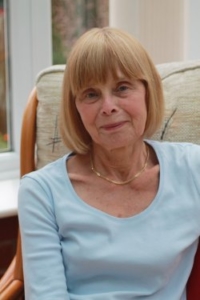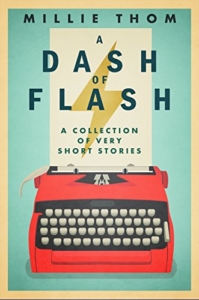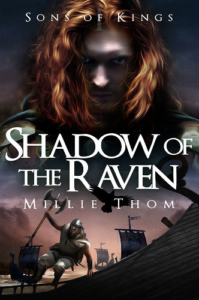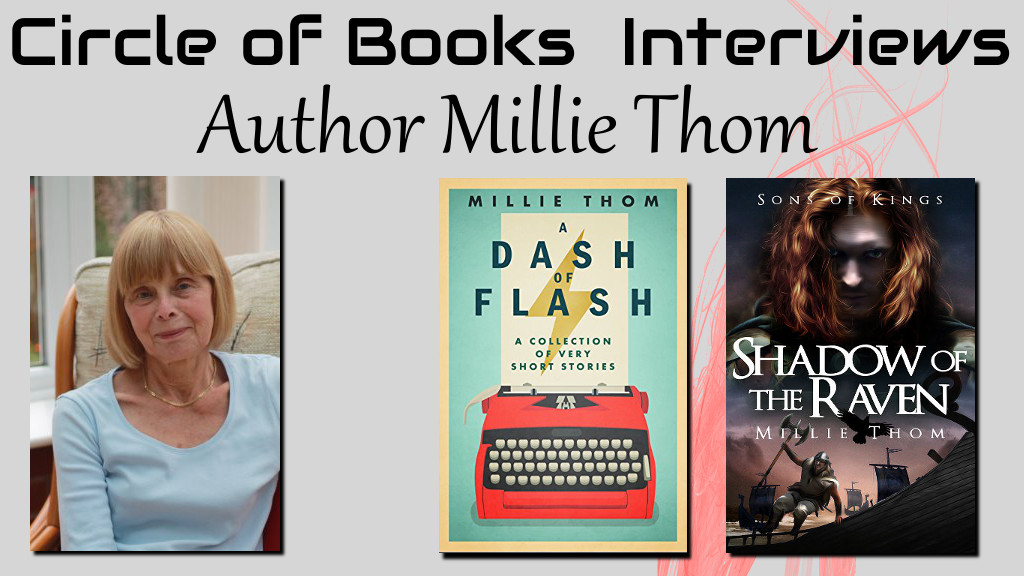Interview – Millie Thom
 |
 |
 |
– When did you start writing novels, what moved you to start writing?
I had many ideas for novels over the years, but hadn’t the time to write anything other than lesson plans and student progress reports! Bringing up six children also took an enormous chunk of my time. Needless to say, it wasn’t until after I’d retired from teaching a few years ago that I actually decided to start writing a particular story that had been in my head since the 1970s.
– In what genres do you write? Do you plan writing in other genres?
At present I write mainly historical fiction. I love history in general and stories set in the past bring historical characters and events alive for me. I’m not limited to any particular time period, although I’d probably steer clear of the Tudor period as there are so many books already out there set at that time – not to mention, movies! However, a novel with an original perspective could still find a niche. I’m considering writing a historical murder mystery for my next book, which will be a welcomed challenge. I can’t rule out the possibility of writing a contemporary novel, either. I have a couple of ideas on that score…
– Tell us about your novels. Why should everyone buy them?
To date I’ve written the first two books of my Sons of Kings trilogy, Shadow of the Raven and Pit of Vipers, and hope to publish Book 3, Wyvern of Wessex, early next year.
The three books centre around the tumultuous events that swept Western Europe in the mid-ninth century as the Viking Danes raided and plundered, bringing terror into people’s lives. We see two sons of kings grow to manhood in very different circumstances, Alfred at the Wessex court and Eadwulf as a slave of the Danes.
As to why people should buy the books… All I can say about that is that I am very character driven in my writing and love to explore what makes people tick. Many of the reviews I’ve had have mentioned being drawn into the characters’ emotions. On top of that, the Viking period is exciting and brutal, and although I’ve shown that in the books, I’ve also tried to show the more peaceful, home-loving lifestyles of the Vikings when in their own villages, as well as their pagan rituals and sacrifices. Friendship and love are developed in the books, too, which, I feel, adds another dimension to the ongoing struggles of the two protagonists.
My third book, A Dash of Flash is a collection of flash fiction pieces / very short stories, all between 100 and 1,000 words. This is very different to my historical trilogy, but I really enjoyed writing these little pieces. Writing such short stories is wonderful practice in being concise, a skill I’ve already learnt from writing my novels. The stories are a mix of historical and contemporary themes, and there are also a few fairy tales. It’s an ideal book for people who don’t have time for becoming immersed in a whole novel, and can be dipped into whenever a few spare moments can be snatched.
– What is your all-time favourite historical fiction novel? What makes it special?
I’ve loved so many historical fiction books! I adored Dorothy Dunnett’s series about Francis Crawford of Lymond, set in Tudor times. The first book, Game of Kings was probably my favourite. It’s special because of Dorothy Dunnett’s brilliance not only in characterisation but in weaving such intricate and convoluted plots. Her complex writing style, together with the Scottish dialect, do make the first book difficult to get into, but it isn’t long before Lymond’s character has most readers hooked.
– Tell us a bit about your writing process.
As all writers, particularly writers of historical fiction, my writing process starts with lots of research. I need to have as much information as possible on characters, dates and events that will feature in the books. It breaks the flow of writing to keep breaking off to look things up once the novel is underway. There may well be small details to check up on, but I like the bulk of the research to be happily recorded before I start.
A plan, or outline, of the book is a must, but often I need little more than to know how the general storyline will play out, but with me, the details emerge as I write, particularly the interactions between the characters, or the depth of emotion they show.
Each time I turn on my laptop to continue a story, I generally read through the last section I wrote to put me in the frame of mind to continue. Once the first draft is finished, I delve into editing with a vengeance. And funnily enough, I usually enjoy it.
– What author would you love to have dinner with?
There are several authors whose brains I’d love to pick whilst sharing a nice meal. Bernard Cornwell is one, but I’d have to be sure I’d read his Saxon Chronicles first! I decided not to do so until I’d finished my own Viking trilogy, which is also about King Alfred. I really love Val McDermid’s books, too, which are crime novels (not historical). She’s a very interesting person, from what I’ve seen of her on TV interviews, with a great sense of humour and I’d love to have a chat with her about her characters and writing in general.
– Tell us about your hobbies and passions other than writing
I love travelling and aim to see as many places in the world as possible over the coming years. I also love visiting lovely places and sites of interest in the UK, so I do have a lot of ‘short breaks’. This is something my husband and I determined to do once I’d eventually retired. I also love to bake cakes, pies, scones – whatever! The habit of baking for six children for years is hard to break. I’m also a very good knitter, but just don’t get time for that while I’m writing. And lastly, I couldn’t go for a single day without reading. Unfortunately, my only reading time nowadays tends to be before I nod off at night.
– We have many followers who would like to start writing a book or are already writing their first novel, any advice for these brave people?
The best advice I can think of is to just do it! Making that initial start is always hard and I’d say, before ‘putting pen to paper’, make sure you have the outline of a story – whether it’s a short story or novel – in your head and on your computer. It may well be the vaguest of outlines, but often things become clearer as you write. It’s true that the best way to learn about writing is just by writing. Having a blog and joining in with writing challenges can also be a great help to aspiring writers. The feedback given by others doing the challenge is really useful
– How often do you write, daily, every other day or?
I try to write every day, but it often ends up being as little as three or four days a week. It depends on what life throws at me that week – and I do tend to write very long blog posts about places we’ve travelled to. I realise this type of post had little to do with writing (Lol) but, as I said earlier, travel is one of my passions. Besides, most places we visit are of historical interest.
– Do you keep a notebook with ideas for your novels? If so do you carry the notebook with you so you won’t forget any ideas?
I always have a notebook with me, and occasionally jot down notes about things I find interesting when I’m out and about – generally when I’m at historical sites. My notebook is a ‘just in case’ thing with me and I tend to take more photos nowadays.
– Being an Historical Fiction author, it must be very important to do a good deal of research. How important is it in this genre to have your facts right and are there any instances when you bend history to fit your story?
I’ve already stressed the importance of thorough research in an earlier question, and having facts correct is simply vital. As for bending history to fit a story, I would never change the dates of historical events, although I’ve seen that done in some books. However there has generally been a word of explanation in the ‘Author’s Note’ at the end. With events about which nothing or very little is known, I think an author can go to town! The same applies to characters. Fortunately, for my period (9th century) little is documented about many events and characters. They are simply given a mention in the Anglo Saxon Chronicle or Asser’s Life of King Alfred, or other documents, so are open to interpretation by willing authors.
– What are you reading at the moment?
I have a few novels waiting to be read, but I’ve just started reading Murder in Abstentia, by Assaph Mehr. This has been calling to me from my Kindle for several weeks, and I’ve just worked my way down my TBR list to it. After that, I’ll read Feud by Derek Birks, followed by Heronfield by Dorinda Balchin. Oddly enough, most books on my TBR list are historical fiction, with a sprinkling of murder mysteries / crime novels.
– A final message for our circleofbooks.com readers.
There are many wonderful books out there, with genres to suit all tastes. Sites like CircleOf Books work wonders to bring many of these to the attention of readers. I find many of the books I read in this way. Indie authors in particular are always grateful to such sites for promoting their books, and I’m very grateful to CircleOfBooks for promoting mine and inviting me to do this interview. And for the many aspiring writers out there, I can’t stress enough how important it is to make that start with your writing instead of just saying you will do … one day.
Thank you for reading!
Thank you Millie Thom. We at circleofbooks.com wish you much success!
Click here to visit Millie’s author page here on circleofbooks.com
Tweet
